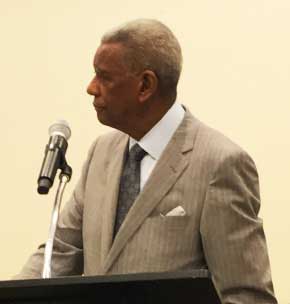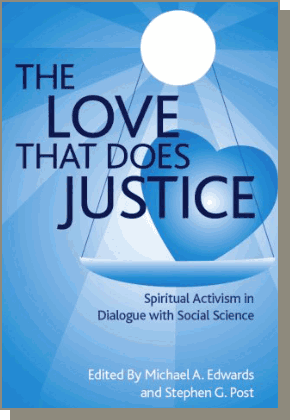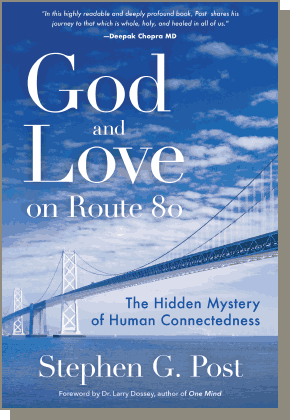
Works of Love
A Newsletter of The Institute for Research on Unlimited Love
July 8, 2020
Greetings Friends:
About 15 years ago I was pleased to give the Rev Martin Luther King Jr lecture on "The Love That Does Justice" at Morehouse College, from which he graduated.
 Otis Moss Jr |
Soon thereafter, the Institute organized a major conference on this topic with the help of Mike Edwards of the Ford Foundation. More than 40 activists and spiritual thinkers convened at University Circle in Cleveland, many of them household names. The product is available to you for free in the form of a full version of the edited book that Mike and I produced.
This is widely considered one of the more significant books on the topic. Thanks to Pastor Otis Moss Jr, a board member of The Institute for Research on Unlimited Love and former Chairman of the Board of Morehouse, who was one of MLK's right hands.
The Love That Does Justice: Spiritual Activism in Dialogue with Social Science
Introduction
Stephen G. Post & Michael A. Edwards
  |
For thinkers and activists across a wide range of contexts and historical experiences, unconditional love, spiritual experience, and the rigorous pursuit of justice in the world constitute a powerful path to social transformation, but only when they are strongly linked together. "Spiritual activists" draw on spiritual worldviews and practices to sustain an inner equilibrium of compassion and well-being while continually-engaged at the hard edges of social change (Horwitz, 2002). They practice what has come to be termed "engaged spirituality," in contrast to the spiritual practitioner who casts the world aside in favor of a socially-disengaged serenity. They take on the difficult work of organizing the downtrodden into groups capable of exerting social and political pressure through persuasion and protest, and do so with reliance on a background picture of a universe in which love and justice go with, rather than against, the grain of Ultimate Reality.
These activists have a defining voice in this book, and thereby offer a counterpoint to the widely-held view that forms of meditation, as practiced in the United States, lie mainly in the repertoire of those who are seeking personal happiness, self-realization, and alternative healing - but not social justice. It may be true that some contemplatives and mystics shy away from engagement in social and political issues, or advocacy with and for those who are the most marginalized and least powerful in society; but this cannot be said of the voices presented herein.
Our collection of essays - some of them in the genre of personal spiritual journey and some more analytic - presents the voices of American spiritual activists and social scientists who reflect together on how to deepen and advance our understanding of the role that spirituality plays in achieving social justice. Encounters between scholars and activists are never easy, but are often necessary to challenge each-other's assumptions, clarify the key issues at stake, and explore the transmission mechanisms that link love and justice in ways that are both conceptually rigorous and deeply-informed by concrete experience. In addition, we have deliberately included contributions from both the new and often younger American spiritual activists who draw so richly on Eastern traditions, and from their monotheistic forbears.
Those spiritual activists who work for social justice and human rights are engaged in a contentious struggle and will be controversial - even hated and persecuted - for their actions. How do they deal with indifference, risk, hostility, imprisonment, and rage? The activist focuses a great deal of psychological energy on a sustained engagement with the powers that be. Essential character traits include courage in the face of threat, perseverance in the face of indifference, composure in the face of rage, equanimity in the face of hostility, and integrity in the face of imprisonment.
There are few internal challenges greater than sustaining love for those who would just as soon see the activist perish. King, Gandhi, Rabin, and many other activists with a vision of a common humanity have been killed for their views and actions; as an Indian saint once said when confronted by the bullet, "I will die loving you." The exemplar of compassion who sets aside the quest for justice is usually on no-one's hit list, and will generally be extolled by a society that looks to elevate its saints. It seems that society can easily forgive the personal flaws of these exemplars of compassion, but not the threats they perceive from the spiritual activist.
In part, spiritual practice is important to many activists because it helps to guard against the "thieves of the heart" - the greed, ego, anger, fear, and insecurities that will likely pollute or erode the success of even well-intentioned efforts to be a positive force for change in the world. This is why the transformation of the Self is so vital. Great inner strength is required to confront the structures of power in the world unselfishly, without demonizing one's enemies, alienating potential allies, or holding on too tightly to a particular vision of ends and means that can eventually become a prison. It is only by operating from the space where we are joined together in some deep sense that we are likely to find true common ground in facing up to the collective problems that confront us. How do activists, with all their human frailties, participate in love when engaged in actions that can easily give rise to bitterness and hatred? How does the spiritual activist refuse to hate the people who perpetuate injustice? How can an underlying love of all allow the activist to cope with adversity? How does the spiritual activist maintain a "higher self?" The answer is that they cultivate love, courage, and hope through spiritual practice in the face of indifference and weariness. Spiritual practice becomes both a spiritually- and politically-subversive activity.
We think that these insights are useful but preliminary. We need to go much further. How can the relationships between spirituality and social activism be better understood? Are there other links between spiritual practice, love, and the pursuit of social justice? And how do these relationships inform social activism today? It is best to begin, in Section One, with profiles written by spiritual activists who describe what spirituality means for their endeavors. We can listen and learn.
Section Two asks how the relationship between spirituality and social activism can be more carefully examined, conceptually and empirically. There are a number of ways to approach this question: through the experiential accounts of those activists whose lives are deeply shaped by spiritual beliefs and practices centering on love and justice; through the sociology of spiritually-engaged social activism; through the psychological study of the perseverance, effectiveness, and emotional qualities of such activists in the light of their spiritual practices and conceptions of love for humanity; through new insights on leadership that show how and why spiritual values and practices are related to effectiveness in organizations (Reave, 2005).
Our purpose is to bring activists and scholars together to share their perspectives and experiences on the link between spiritual practice, unselfish love, and the rigorous pursuit of social justice, and on how these relationships inform social activism today. Through dialogue and sharing, we hope that activists can help scholars to develop future research agendas, and that scholars can contribute their perspectives on the work in which spiritual activists are engaged.
Michael A. Edwards, Director, Governance and Civil Society, The Ford Foundation
Stephen G. Post, President, The Institute for Research on Unlimited Love
Download The Love That Does Justice for Free
References
Horwitz, Claudia. The Spiritual Activist: Practices to Transform Your Life, Your Work, and Your World (New York: Penguin Compass, 2002).
King, Jr., Martin Luther. Strength to Love (Philadelphia: Fortress Press, 1963).
Reinhold Niebuhr. The Children of Darkness and the Children of Light (New York: Scribner's, 1944).
Reave, Laura. Spiritual values and practices related to leadership effectiveness. The Leadership Quarterly 16 (2005) 655-87.
Stephen G. Post
[[trackingImage]]